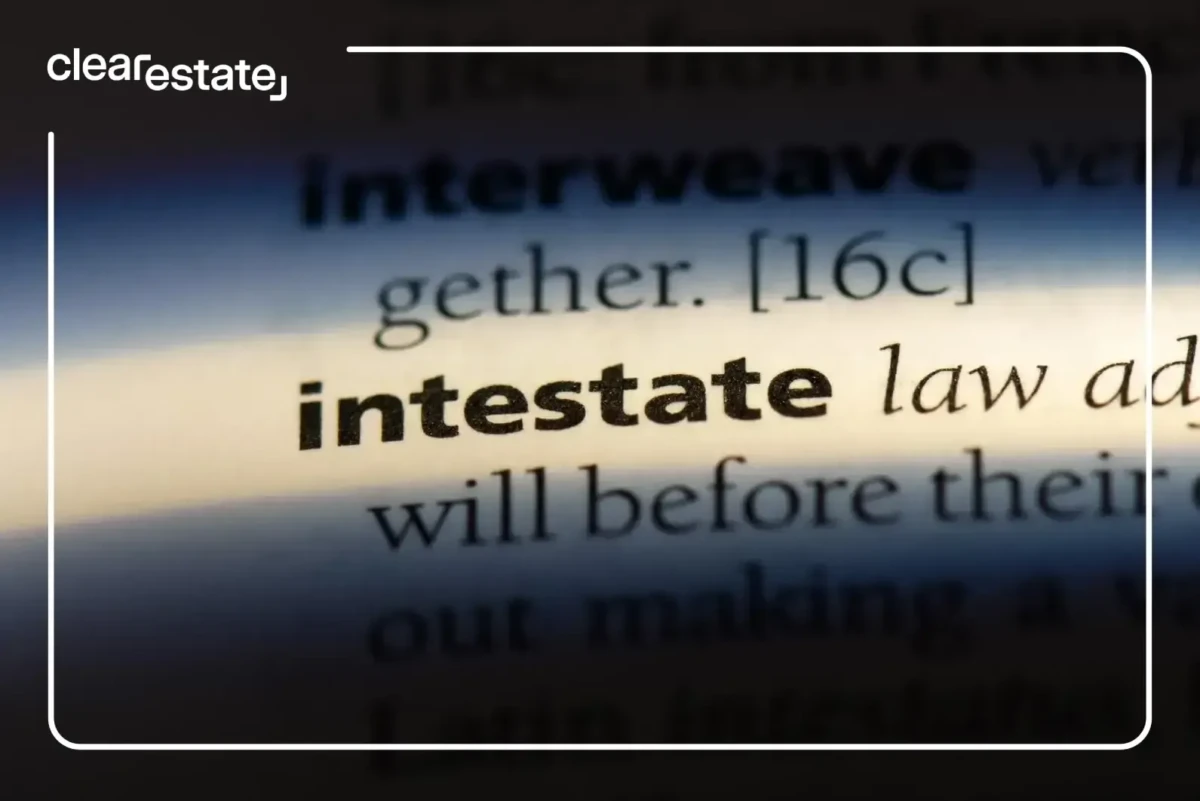Estate Settlement
Dec 04, 2024
How to Stop Mail for a Deceased Person: 5 Steps
Learn how to stop mail for a deceased person with our 5-step guide to protect their identity and ease estate management.
The lack of a will makes the process of settling an estate much more challenging.


When an individual dies without a will (also known as dying "intestate"), the assets they leave behind get divided according to specific regulations. It doesn't matter if they told their relatives how to distribute their assets before they died--their plans aren't valid unless they made an official will. The government distributes their assets according to local and federal laws, regardless of the decedent's wishes.
The lack of a will makes the process of settling an estate much more challenging. Knowing how the process plays out without a will and having a partner like ClearEstate can help you reduce stress and shorten the process, enabling beneficiaries to receive their assets as soon as possible.
In the state of Florida, the court distributes assets according to succession laws.
A surviving spouse receives the entire estate if the couple had no children. If they did have children together, the surviving spouse receives the entire estate.
If the deceased has surviving children from another relationship, the surviving spouse receives 50% of the estate and the surviving children equally share the other half.
For unmarried individuals with no children, the estate goes to their parents.
If the deceased’s parents are no longer living, the estate goes to their siblings.
No surviving siblings? The estate goes down the succession line to their nieces and nephews, grandparents, aunts and uncles, or cousins.
Typically, the state divides assets evenly among the decedent's children. For example, if an individual had two children and no spouse, each child receives half their estate. Biological and adopted children have the same rights, but stepchildren, foster children and children that they put up for adoption may not be eligible for the inheritance.
If the decedent has no surviving family members at all, their property goes to Florida's Chief Financial Officer (CFO). The CFO holds the property for ten years so surviving heirs have a chance to reclaim it. After a decade passes, the CFO gives the estate to Florida's School Fund.
To settle an estate without a will, the court appoints someone to act as the estate executor. This person, who is usually the next of kin, gathers documents, files a petition for probate - letters of administration, attends hearings, collects assets, pays the decedent's debts and taxes, and distributes assets according to state laws. In other words, they do everything an estate executor named in a will would have to do, except that there’s probably less time to prepare for the tasks ahead.
The probate court can appoint anyone as the estate executor — including you. You'll have to abide by court orders, but you'll have some control over the estate settlement process. Once you complete the process, you'll close the estate and move on. Of course, you can decline the role, at which point the court will go down the line of succession to find an executor.
Regardless of whether the decedent left a will, becoming an estate executor in Florida means taking on responsibilities that you've never tackled before. For example, do you know how to file a petition for probate or pay the decedent's taxes? Accepting this responsibility without preparation adds more stress to a challenging period in your life.
Without a will, heirs have little control over how the state distributes the assets. This compounds your frustration if the decedent's relatives argue or initiate legal challenges. If the decedent promised you an inheritance but hasn’t left a will, you won't be eligible to receive anything if you're not in the line of succession.
Dying without a will means that the decedent never planned for taxes, debts, liabilities or funeral costs. You'll have to deal with liabilities while maximizing the beneficiaries' inheritance. In some cases, the heirs get much less than they expected. This leads to more stress, arguments and potential lawsuits.
In Florida, regardless of whether there is a will or not, you do need the services of an attorney to help settle an estate. Specifically, in the state of Florida, an attorney is required to file for probate. To initiate the probate process, your attorney will ask you to provide a list of the estate's assets and liabilities. ClearEstate’s Estate Settlement Solution helps create the inventory of assets and automatically aggregates all financial assets in a few clicks. In other words, we do the work that the attorneys would tell you to do. ClearEstate engages the services of an attorney on an only-when-you-actually-need-them basis.
Schedule a free 30-minute consultation with ClearEstate to ask us your questions about estate settlement. We'll even tell you how working with ClearEstate when settling an estate will shorten the process and take much of the responsibility off your hands.
 Simplify Probate Today
Simplify Probate Today
Get expert guidance from our specialists who've helped 10,000+ families.
Book a free consultation